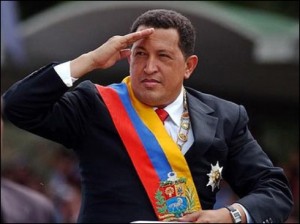
A characteristic of the current Spanish government’s foreign policy has been a softly-softly approach to potentially explosive issues. Prime Minister José Luis Rodríguez’s old nickname, ‘Bambi’, may now be out of date on the domestic front, but on the international stage, he still treads with the caution of a deer through the woods.
Since angering George W. Bush by withdrawing Spanish troops from Iraq on taking office in 2004, Zapatero and his foreign minister, Miguel Ángel Moratinos, have often gone to great lengths not to upset their counterparts –in Morocco, Cuba and France, to mention just three examples– through their soft diplomacy.
Lately, however, their tolerance has been stretched by Venezuela’s Hugo Chávez, who appears unwilling to take seriously Spanish claims that his country has been used as a training ground for ETA terrorists.
The testimonies of two suspected members of the Basque group who were arrested recently in Spain gave detailed accounts of their own terrorism training in Venezuela in 2008. They also identified Arturo Cubillas, a Basque with Venezuelan nationality who moved to the Andean country in 1989 and who now holds a post in the Chávez government, as the organiser of the course they undertook.
Chávez has dismissed the testimonies of the two “bloody murderers” and his foreign minister raised the temperature of the furore by suggesting they had been tortured by Spanish authorities when they gave their statements. Cubillas, meanwhile, still holds his post.
The Spanish response has been typically demure. While continuing to press for cooperation on investigating ETA’s presence in Venezuela, the government has pulled back from suggesting the Chávez administration has in any way supported the group.
“There is no data, no comment by the two suspected ETA members that might let us infer, deduce, or even suspect that the Venezuelan government has something to do with this,” said Interior Minister Alfredo Pérez Rubalcaba on October 5.
But despite Rubalcaba’s words, the evidence is mounting that Venezuela under Chávez has become a safe haven for ETA, in much the same way that France was before that country’s authorities started to clamp down on the separatists.
Apart from the evidence given by the two detained men (under duress or otherwise), Venezuela’s hospitality to members of ETA and Colombia’s FARC guerrillas was detailed in the now famous laptop belonging to the latter group’s Raúl Reyes, who was killed in Ecuador in 2008. Another document seized from the ETA leader known as Thierry, who was arrested in 2008, reinforced the Andean connection.
With any political weakness on issues related to ETA liable to be punished by Spanish public opinion, Zapatero runs the risk of allowing his cautious approach to Chávez to add to his current list of woes.
Losing face or losing money?
“What power does Hugo Chávez hold over this government?” asks right-wing commentator Hermann Tertsch. “What is it that Hugo Chávez knows or has which ensures the Spanish government doesn’t even dare save its own face before Spain’s incredulous public opinion? One day we will find out.”
What both governments know (in fact what most people other than Tertsch seem to know) is that Spain has enormous business interests in Venezuela.
As QorreO writer Marty Delfín noted in an article on the global reach of ETA, the FARC and Al Qaeda earlier this year: “Over the last two years, Spain has penned agreements worth hundreds of millions of euros in Venezuela’s energy industry. Last year, Spanish energy giant Repsol, working alongside state-owned Petróleos de Venezuela (Pdvsa), made a major find in the Gulf of Venezuela that, officials say, could yield as much as 1.5-2.0 trillion cubic-feet of natural gas from underneath the massive body of water off the country’s Caribbean coast (…) Repsol has begun tapping into a field in the Orinoco basin called La Perla, which experts believe contains between one and 1.4 billion barrels of heavy crude. Spain’s share in the project could help meet the country’s energy needs for five years. The company has also agreed to refine one million barrels of Venezuelan crude in Spain, which would generate huge profits for the Spanish government.”
As Chávez gleefully warned in March, when his country’s ETA connections first became public, Spain has “a lot more to lose” than Venezuela if its legal authorities insist on pursuing the case.
Nonetheless, the Spanish government also has plenty to lose in terms of political capital at home if it is perceived to be kowtowing to the caudillo. King Juan Carlos knows the value of standing up to Chávez in public after telling the leader to “shut up” at an international summit in 2007.
Rubalcaba is right, of course. There is no evidence that, in some mistaken notion that ETA is a genuinely leftist revolutionary group fighting for a fairer world, Chávez actively backs the organisation. But the Venezuelan leader has clearly turned a blind eye to its activities in his country and, with an apparently active member of ETA holding a high-profile post in his government, perhaps it is time Zapatero stopped treading so carefully and demanded some answers, for his own sake as much as anything.
Leave a Reply
You must be logged in to post a comment.